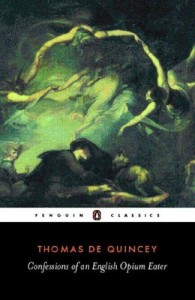De Quincey's Confessions of an English Opium Eater

De Quincey's Confessions of an English Opium Eater is a strange little book which is quite unlike anything I have ever read. It's one of those unique pieces like Pale Fire or Herodotus's Histories where it does not fit neatly into any genre. In a way, it is a drug memoir, but it has large essay like portions and the most autobiographical piece is of a period of time where de Quincey ran away as a teenager and traveled through Wales and lived on the streets of London. It talks about the good and bad of Opium addiction, but that is idiosyncratic as well and less autobiographical. The bad effects of Opium are mostly limited to the freaky dreams that de Quincey has. It is in short, a unique little
quirky book.
De Quincey's prose style is also very quirky. It is closest to some of the more baroque examples of English 18th century writing and I suspect that it felt a little arachaic to his contempories (the book dates from 1822). It is also erudite, witty, charming and filled with classical references. De Quincey was a personal friend of Coleridge and the book is very much within the English romantic movement, but is widely informed by a large swarth of learning. At times de Quincey's prose style becomes so Baroque it does not work, but the wit and the charm of the piece in the end always keep it humming along.
De Quincey was constitutionally an outsider, so while his opium use does not have the back alley criminalized squalor of today, he did during his period as a runaway become intimately familiar with that world. De Quincy is one of those few persons who is as comfortable conversing with a teenage prostitute as an English lord and meets everyone on their own terms and instinctively treats them as equals. I'm like that as well, and as such I recognize in him some of the ingrained comfort with being half on the outside and half on the inside of everything. It is hard in de Quincy's case not to link these character traits with his opium use and de Quincy seems aware of the connection but never articulates.
While the criminalization of narcotics has so changed the culture of drug use that much of it is unrecognizable, the class stratification, and life in the underbelly is quite the same as it is today. I am always struck by the familiarity of street life that I find in Dickens, Orwell, Zola and others but de Quincy's is the earliest account that I am aware of a street life that remains today fundamentally unchanged.
The dream accounts are unforgettable and I am sure influential. I am a Lovecraft fan, and some of the dream passages are so reminiscent of Lovecraft that I was expecting at any time the word "cyclopean" to appear.
It would be hard to classify Confessions as amongst the greatest of all works, but it is clearly a very clever and eccentric work by a very clever and eccentric man. Also, its brevity means that there is a high reward for the time invested.
 2
2



